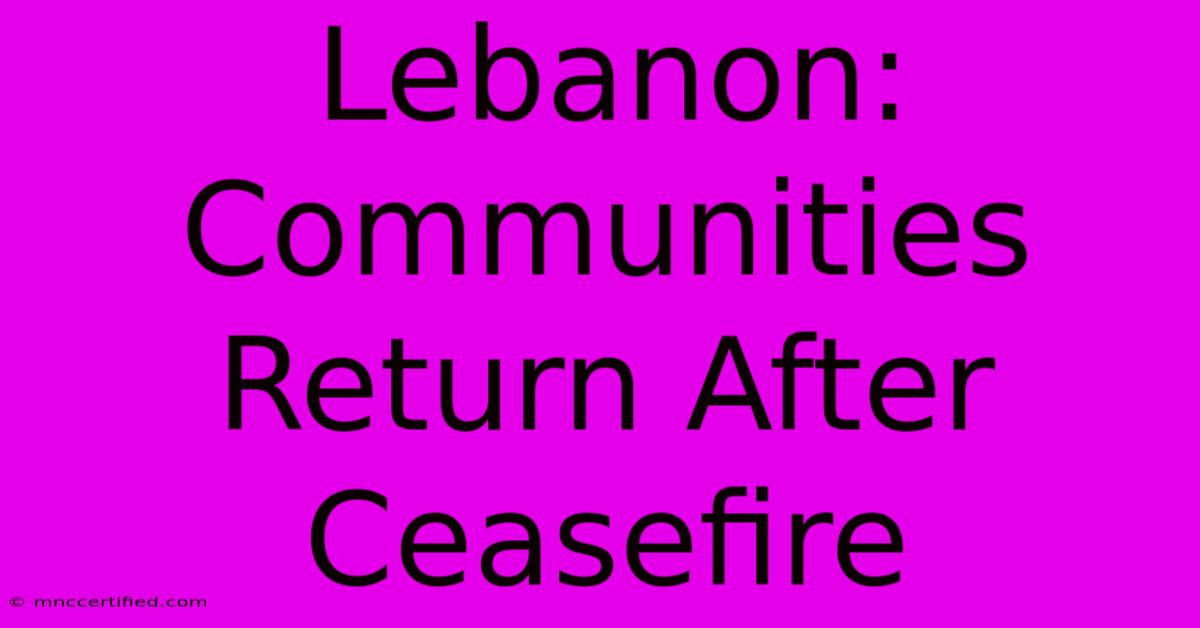Lebanon: Communities Return After Ceasefire

Table of Contents
Lebanon: Communities Return After Ceasefire – A Nation's Slow Recovery
The recent ceasefire in Lebanon has brought a fragile peace, allowing communities displaced by conflict to begin their long journey back home. This return, however, is far from straightforward, fraught with challenges that demand immediate attention and long-term strategic planning. This article delves into the complexities of this repatriation, exploring the obstacles faced by returning families and the crucial steps needed for sustainable rebuilding.
The Aftermath of Conflict: A Landscape of Destruction
The conflict left a devastating mark on Lebanon, leaving behind not only physical destruction but also deep-seated trauma and societal upheaval. Homes lie in ruins, infrastructure is crippled, and essential services are severely lacking. The scale of the damage requires a monumental effort for recovery. Many villages and towns are virtually unrecognizable, their once vibrant streets now scarred by conflict. This widespread destruction presents a major hurdle for those attempting to return to their lives.
Key Challenges Facing Returning Communities:
- Homelessness and Shelter: Many returning families find their homes completely destroyed or uninhabitable, forcing them to live in temporary shelters or with relatives, creating overcrowding and further straining resources. Securing adequate housing is paramount.
- Lack of Essential Services: Access to clean water, sanitation, healthcare, and education is severely limited in many affected areas. This lack of basic necessities poses a significant threat to public health and hinders the process of rebuilding lives. Restoring essential services must be a priority.
- Economic Hardship: The conflict decimated livelihoods, leaving many families without income or means of support. The destruction of businesses and agricultural lands has exacerbated this economic crisis, leading to widespread poverty and hindering the ability to rebuild homes and lives. Economic recovery programs are crucial for long-term stability.
- Psychological Trauma: The experience of conflict has left deep emotional scars on individuals and communities. Many people are struggling with PTSD, anxiety, and depression, requiring access to mental health support. Addressing mental health needs is essential for a holistic recovery.
- Landmine Threat: The pervasive presence of unexploded ordnance and landmines poses a constant danger, hindering safe return and reconstruction efforts. Demining efforts are critical for securing communities.
The Road to Recovery: A Multi-faceted Approach
Rebuilding Lebanon will require a comprehensive and coordinated effort from multiple stakeholders, including the Lebanese government, international organizations, NGOs, and the international community. This involves a multi-pronged strategy encompassing:
1. Emergency Relief and Humanitarian Aid:
Immediate needs must be addressed through the provision of food, water, shelter, medical care, and psychosocial support to returning populations. International aid is crucial in this initial phase.
2. Infrastructure Reconstruction:
Rebuilding damaged infrastructure, including roads, bridges, schools, and hospitals, is crucial for restoring essential services and enabling economic recovery. This requires significant investment and coordinated planning.
3. Economic Revitalization:
Creating employment opportunities, supporting small businesses, and investing in agricultural recovery are vital for boosting the economy and enabling families to rebuild their lives. Sustainable economic development is key to long-term stability.
4. Addressing Psychological Trauma:
Providing access to mental health services, trauma-informed care, and psychosocial support is crucial for helping individuals and communities heal from the psychological wounds of conflict. Investing in mental health is an investment in the future.
5. Promoting Reconciliation and Social Cohesion:
Fostering dialogue, promoting reconciliation, and addressing underlying social divisions are essential for creating a peaceful and inclusive society. Social cohesion is critical for long-term stability and peacebuilding.
The Role of the International Community
The international community has a vital role to play in supporting Lebanon's recovery. This involves providing financial aid, technical assistance, and expertise to help the government and local communities rebuild their lives. Sustained international support is essential for ensuring a successful and sustainable recovery.
Conclusion: A Long Road Ahead
The return of communities to Lebanon after the ceasefire marks a significant step towards recovery, but the road ahead is long and challenging. Addressing the multifaceted challenges outlined above requires a concerted and sustained effort from all stakeholders. Only through a coordinated and comprehensive approach can Lebanon rebuild its communities, heal its wounds, and forge a path towards lasting peace and prosperity. The journey will be arduous, but with determination and collective action, a brighter future is attainable.

Thank you for visiting our website wich cover about Lebanon: Communities Return After Ceasefire. We hope the information provided has been useful to you. Feel free to contact us if you have any questions or need further assistance. See you next time and dont miss to bookmark.
Featured Posts
-
How To Invest In Joby Aviation
Nov 28, 2024
-
Uk Lottery Winner Claims 177m Prize
Nov 28, 2024
-
Spotify Wrapped 2024 Official Teaser
Nov 28, 2024
-
Aston Villa Vs Juventus Champions League Result
Nov 28, 2024
-
Groucho Club Shut After Serious Incident
Nov 28, 2024